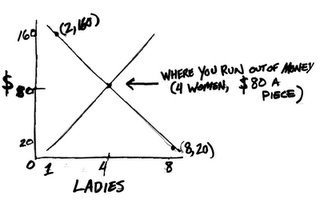 It's strange though that so much is invested in pleasing our partners on one (or maybe a few, including anniversaries and birthdays) particular days of the year. Assuming that lovers (like the rest of society) exhibit concave utility functions, then a suitor would please his partner more by spreading the love more evenly over the 365 days of the year. This is because presumably girls get a lot of enjoyment out of getting a rose but probably get, on a marginal basis, less from the 11th and 12th roses. Better then to give one a week, rather than a bunch on only a few isolated days.
It's strange though that so much is invested in pleasing our partners on one (or maybe a few, including anniversaries and birthdays) particular days of the year. Assuming that lovers (like the rest of society) exhibit concave utility functions, then a suitor would please his partner more by spreading the love more evenly over the 365 days of the year. This is because presumably girls get a lot of enjoyment out of getting a rose but probably get, on a marginal basis, less from the 11th and 12th roses. Better then to give one a week, rather than a bunch on only a few isolated days.However, the concentration of expressions of love is a long-standing practice and if there were a strategy that would trump such behavior it should have already emerged. This would be especially true in a competitive market, which the market for lovers appears to be (although there are some increasing returns to scale issues, I have been reliably informed it's not all about size).
This makes me think that such arrangements are a response to some defect in the market, most likely an information asymmetry. I know how I feel about my wife but she obviously has a disadvantage in matching my knowledge on my feelings, and vice versa. To fill this gap, it's probably necessary to reaffirm the relative strength of my feelings occasionally (hence the caramel sundae).
In this way, Valentine's day is like renewing a contract. If I was instead to give a rose a week then this would be equivalent to a spot market where I could easily transfer relationships from week to week. At the beginning of each week the cost of continuing is just that of a rose.
Yet, if I instead had to buy a bunch of roses before continuing the relationship, this act would reveal more to my partner than what I intend to do over the next week. Of course, after I've given the roses they're are a sunk cost and if I change my mind I'd be best to leave without considering the costs of the roses. But the extent of the Valentine's Day gift will at least reveal to my partner my long-term intentions on Valentine's eve and in this way it is an important solution to the information asymmetry.
This explanation may also uncover why married people tend to celebrate such days with less intensity. Being married I've already signed a contract and there are more ramifications than just wasted roses if I break that contract. So, there is no need for elaborate expressions of love (again, hence the caramel sundae).


6 comments:
What about decreasing utility. If a girl gets a rose every week from her beloved, it becomes expected and (presumably) looses its effect. The rose looses its value and becomes less special. You touched on this with the single versus a dozen roses. But obviously it extends to why men don't spread their displays of affection over time but instead choose to concentrate.
It could also be that men are calculating. Revealed preference from ones partners must indicate that the 'benefits' from a dozen roses once or twice a year outweighs the 'benefits' from one a week.
I just can't believe you gave your better half a caramel sundae from Macca's!!!!
Come on Matty, what's wrong with some Powers Brewery's finest???
Pull ya bloody socks up!
What did she get you? There's your market failure.
What is all this talk about markets failing?
From a male perspective, the main problem with Valentine's day is that roses and chocolates etc are expected. Thus, providing them merely returns one to the status quo; while failure to do so lands one in her bad books.
A similar problem arises when a flower seller interupts a romantic dinner at a restaurant. Her presence in effect imposes an externality on the male, for his chances of getting layed fall upon her arrival unless he purchases the rose, at which point they return to their previous level. That is, the flower sellers' offer to sell him a rose makes him worse-off.
Speaking as a female, I'm sorry to report that even if a man (by the sounds of it, the perfect boyfriend) bought me a rose every week or every day, I'd still expect something bigger and better on Valentines, Birthdays, and Anniversarys. Survey most (honest) women and you'll get the same answer. Bitchy? Perhaps. But unless you've got a hidden interest in Heath Ledger, you poor guys can't escape it.
Post a Comment